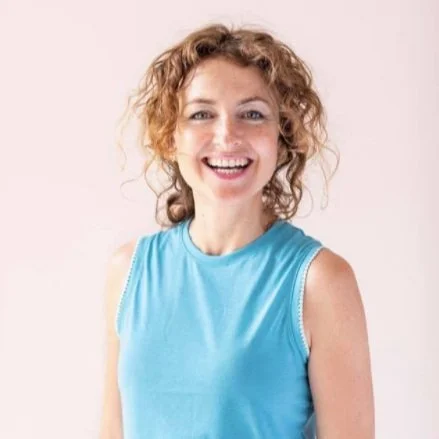PHASE TWO
WHEN COVID LASTS

You have COVID, but you're not alone.
I won't sugarcoat things—when COVID sticks around, it's a hard pill to swallow. This is the time to dig deep, create healthy habits, and practice positivity so you can not only recover from COVID but come back better than ever!
In this section, you’ll learn practices, tools, and tips to help you cope and recover. We’ll show you how to transform from a COVID long hauler to a STRONG HAULER. This is the time when you’ll integrate positivity into all components of your life.
You’ll develop and deepen your relationship to a positive MINDSET.
You’ll commit to proper REST because rest is the key to your recovery.
You’ll step up your game in the NOURISH department and learn to identify what your body needs and how to provide your body with the fuel it needs to heal.
You’ll explore healthy, joyful ways to MOVE your body as you gain strength and stamina.
We’ll meet you where you are!
Rebecca Solnit

MINDSET
Belief in recovery is the magic ingredient. Learning to tap into joy at this point is critical, and patience is equally important. Every day you get another opportunity to start again. Please don't be discouraged if you feel you're taking one or two steps back after making progress. I know this is easier said than done, but show yourself the way forward moment by moment. This is where you’ll learn to believe that you will recover, that you can trust your body, that patience is required, and that joy will get you through this.

What We Know
Our thoughts become reality.
COVID is a beast, but you are strong.
Patience is defined as, “the capacity to accept or tolerate delay, trouble, or suffering without getting angry or upset,” and therefore patience is your friend.
The people who believe they will recover are more likely to recover. This mindset is bolstered by being proactive and surrounding yourself with positive people who also believe in your recovery.
Depression and anxiety are very real symptoms of COVID and should not be taken lightly. There were times that I thought I was going crazy. My suggestions are offered to help cope with the complex set of physical and psychological symptoms but should not replace professional mental help.
You’re not a passive victim waiting for a cure—you are empowered and advocating for yourself—but some problems are too big to handle on your own. Please reach out to a Cognitive Behavioral Therapist for additional coping strategies if you feel the weight is too great to bear. In the meantime, here is my In the Thick of it Meditation.
in positivity brings health.

What Works
Believe. Writing your Recovery Story is an important exercise. It's intimate, beautiful, and the ultimate goal. This is not the time for a little pep talk. This is the time to dig deep. Begin by imagining how you’ll feel when you've fully recovered.
Ask yourself:
- What does it look like?
- What are you wearing?
- Who are you with?
- What are you saying?
- How does it smell?
- What is the temperature?
- Is there a sound?
Get to know these details intimately so you can feel the experience.
Trust. This is where you trust that your body wants to heal. Surrender to the pace and the process. I know this sounds impossible most of the time when your body is hurting, but I also want you to trust me! I created this meditation that guides you through how to do this.
Joy. Your positive mindset during this initial phase is paramount. I'm not expecting you to laugh through the discomfort, but remain hopeful and smile when you can, which will aid in healing! The biggest piece here is to identify what brings you joy, and with COVID it can be hard to remember. Please listen to this Calm and Joy meditation for some guidance.
Laugh. Laughter is good medicine. When I was at my lowest, my friend got on the phone and asked me to laugh with her. It turned my day around. Please watch the video below and laugh with me!


What Gets In The Way
Comparing your recovery to that of any other person. We all recover at different speeds. Someone who contracted COVID when you did might be better after three weeks, and you might be strong hauling your way into your sixth month.
Joining support groups can be helpful, as it is nice to know that there are others that are going through the same difficulties, but be aware that many people who have fully recovered have left the groups and returned to living their lives. Be careful to not expose yourself to too many hard stories. Seeds get planted in our subconscious minds easily.
Media news can be informative but often sensationalizes horror stories. Be mindful of the source.
TAKEAWAY: Visualize your recovery. Trust your body. Be patient with yourself. Have fun. You got this!
Book Recommendation: Full Catastrophe Living: Using the Wisdom of Your Body and Mind to Face Stress, Pain, and Illness by Jon Kabat- Zinn.

REST
As human beings, we need to manage our energy for optimal performance, but we often move at a pace that isn't sustainable. This is true in sickness and in health, but at this point in your COVID recovery pay close attention to what works and what doesn’t. It’s actually quite simple:
Do everything that makes your recovery easier, and avoid everything that makes it harder.
Proper rest doesn't come easily for everyone. This section will remind you how to give your body the rest you need during this time.

What We Know
We get into routines that, over time, need to be reevaluated. Now that you've taken a step back to allow your body to heal, this is a sacred time to pay close attention to what works and what doesn't. The energy you have (which may be limited) should be put towards what fuels you.
Your number one job right now is to prioritize ease and make it an integral part of your life's repertoire.
Healing and recovering is very revealing. You will discover what nourishes you and what depletes you.
Rest isn’t just sleep. There are many areas of our lives where we can get rest.

What Works
Do an energy audit. I often find the best first step is doing an inventory to discover what you can eliminate to create more space in your life. Our lives are so busy and cluttered that sometimes all it takes is allowing ourselves more space, after which we feel an immediate release of pressure. Through this inquiry, you'll shed mental and physical weight that's keeping you from recovering, and you'll have more energy for healing and encouraging your happiest and healthiest life, which is ahead of you, not behind:
Energy Audit
- Pay attention throughout your day to how you're spending your energy.
- Notice what gives you energy and what takes your energy.
- What are you spending your time thinking about?
- Isolate each thought and ask yourself if it makes you feel good.
- Ask yourself if the people you're spending time with give you energy or not.

My advice to you is this: control the controllables. There are many things in our lives that we cannot control but we can control how we respond. We can start by accepting the unknown. You can do this by listening to the Finding Peace in Uncertainty meditation (video below) and then reflect on these thoughts:
- The body will relax when the mind says that it's OK to relax.
- Do what you need to feel safe and secure.
- The path of healing is full of pleasure. Ask yourself: Where does happiness lie for me?
- If you find yourself stuck in a symptomatic rut, Ask yourself: What is keeping me from healing?
- Pace yourself. Change the pace as needed, which could be daily, hourly, or by the minute.

Finding Peace in Uncertainty Meditation

What Gets In The Way
Overdoing. We're inclined to add more to our daily lives as if there's a magic solution to reduce stress. More exercise, more supplements, more tricks, more remedies. This is an outstanding example of a time when less is more.
Resisting the process. I know how much patience is required during this time. We want to jump back into our old routines. The urge to move on is strong, but I beg you, please, be gentle and patient with yourself. You'll reap the benefits if you do. Like the germination of a flower, we cannot rush the process. To ask a flower to bloom in the middle of winter is wrong. Embrace new rhythms in your life, your own natural rhythms.
TAKEAWAY: Stop throughout your day and take stock of how you’re feeling. Are you tired? Can you can a break? Rest is the new success! When in doubt, lounge!
Book Recommendation: Sacred Rest, by Saundra Dalton-Smith (Note: This book speaks about many types of rest that are important but that you may not have considered. Dr. Dalton-Smith uses the frame of Christianity, but as a Buddhist I believe the concepts to be nonsecular and universal.

NOURISH
Nourishing yourself is just another way of being kind to your body and helping it heal! In this section, we’ll go beyond the basics of an anti-inflammatory diet and get you eating and operating at an optimal level.
What We Know
Michael Pollan says, “Eat food, not too much, mostly plants.”
It takes energy for our bodies to digest food, and what, when, and how often we eat affects our health and recovery from illness.
Diet has long been used to treat illnesses like cancer, diabetes, and heart disease, and now diet can help you heal from COVID.
Figuring out what works for your body and your healing process is the first step, then planning and preparing food so that you’re not forced to eat on the fly and eat junk that doesn’t nourish you.

What Works
Exploring how you feel mentally, emotionally, physically, and spiritually when you eat certain foods.
Experimenting with anti-inflammatory foods to create recipes that you enjoy, that make you feel good, and that fit your lifestyle. It can be easy to fall into a rut of picking up a rotisserie chicken and bag of mixed greens and calling it dinner, but this is a fun time to diversify your recipes. Here are a few of our favorite recipes!
Some Recipes to Try
BREAKFAST: Banana Egg Oat Pancakes
LUNCH: Five-Minute Salad

What Gets In The Way
Junk food. Junk food always gets in the way, but while recovering from COVID it’s critical to eat whole food, and to reiterate Michael Pollan: “Eat food, not too much, mostly plants.”
Not stocking your house with healthy food.
Not eating and being scared to eat. I know I’m giving you a lot of information and suggestions on what and how to eat, but it’s important to feed both your body and soul and TRUST yourself to know what’s right for you. If you’re hungry, just make sure you eat.
TAKEAWAY: Learn what nourishes you. Experimenting and exploring will put you on the right path to recovery.
Book Recommendation: Dr. Will Cole, Intuitive Fasting. Don’t be turned off by the word fasting. This book is full of great tips and will teach you so much about how your body processes food.

MOVE
It might sound strange that I’m telling you to slow down while also telling you to move, but pacing is everything! In this section, you’ll learn how to pace yourself mentally and physically.

What We Know
Moving and increasing blood flow is essential, but so is pacing yourself because doing too much at this point will lead to a crash and setbacks to your recovery.
In this video, these experts discuss the why, when, and how of pacing and what “activity management” actually involves. Long Covid’s most important lesson is “get it wrong at your peril, and get it right and you give yourself the best possible chance at recovery.”
Remember what we said in Phase 1, that walking is the simplest route to health and conscious walking will elevate your healing. We know it can be hard to get moving, this walking meditation will help you get started. Let’s take a walk together!
Yoga with Suzy Bolt
Check out this Rest, Repair and Recovery yoga session. It’s a great way to move, no matter where you are with your recovery.

What Works
Find a Physical Therapist. Find a good PT who can teach you what your body can tolerate, whether you need to stay in a zone for your optimal heart rate, or if you're dealing with shortness of breath.
Keep walking! It’s not about stronger or faster. It’s about moving at a pace that works for you to encourage healing and pushes you to the point of growth but not fatigue.
Walk in nature when you can. Observe your surroundings, bring a journal, and if you find a bench have a seat.

What Gets In The Way
Trying to do too much.
Trying to keep pace with your old life.
Falling prey to other people’s expectations.
lounge!

This video will help you understand what experts around the world are saying about pacing. The worksheets discussed in this video will help manage your activities and reduce your fatigue. First use the activity tracker and then take your findings and use this worksheet to discuss pacing with your physical/physiotherapist. These had a huge influence on my recovery!
TAKEAWAY: “There might be something special about walking in that walking is something that organizes the nervous system—you know, we evolved to walk.” Norman Doidge
Book Recommendation: The Joy of Movement: How exercise helps us find Happiness, Hope, Connection, and Courage by Kelly McGonigal.



